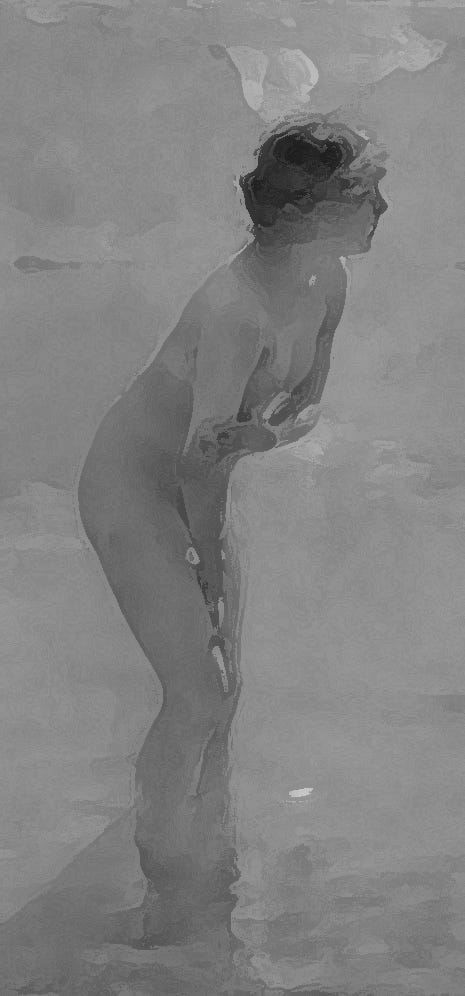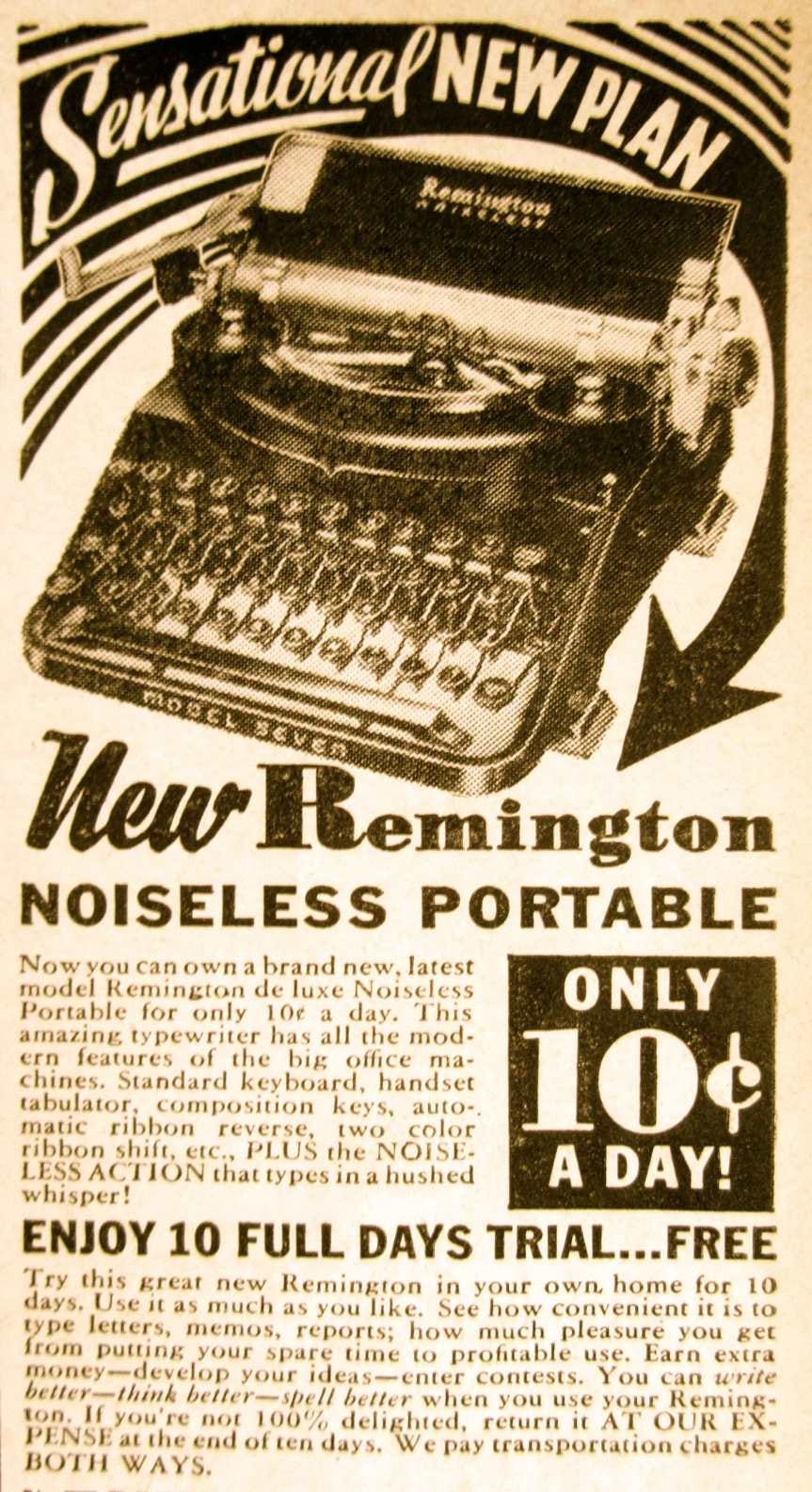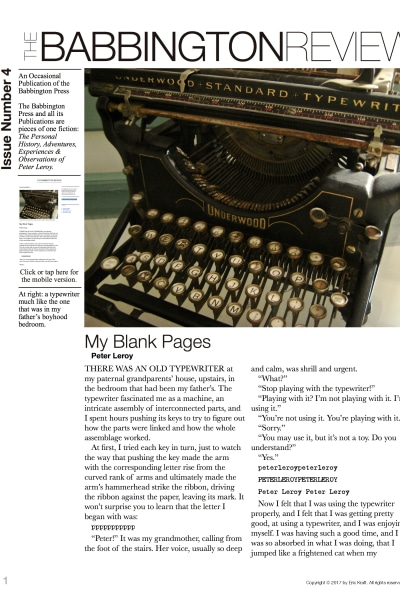THERE WAS AN OLD TYPEWRITER at my paternal grandparents’ house, upstairs, in the bedroom that had been my father’s. The typewriter fascinated me as a machine, an intricate assembly of interconnected parts, and I spent hours pushing its keys to try to figure out how the parts were linked and how the whole assemblage worked.
At first, I tried each key in turn, just to watch the way that pushing the key made the arm with the corresponding letter rise from the curved rank of arms and ultimately made the arm’s hammerhead strike the ribbon, driving the ribbon against the paper, leaving its mark. It won’t surprise you to learn that the letter I began with was:
ppppppppppp
“Peter!” It was my grandmother, calling from the foot of the stairs. Her voice, usually so deep and calm, was shrill and urgent.
“What?”
“Stop playing with the typewriter!”
“Playing with it? I’m not playing with it. I’m using it.”
“You’re not using it. You’re playing with it.”
“Sorry.”
“You may use it, but it’s not a toy. Do you understand?”
“Yes.”
peterleroypeterleroy
PETERLEROYPETERLEROY
Peter Leroy Peter Leroy
Now I felt that I was using the typewriter properly, and I felt that I was getting pretty good, at using a typewriter, and I was enjoying myself. I was having such a good time, and I was so absorbed in what I was doing, that I jumped like a frightened cat when my grandmother, from directly behind me this time, said, “This is a waste of paper.”
A waste of paper? Really? I’d been thinking that I might take this sheet of paper downstairs to show the family how adept a typewriter user I’d become.
“You may use the typewriter as much as you want and as often as you want. You may use as much paper as you want—but you have to use the typewriter and the paper. Don’t abuse the typewriter and don’t waste the paper—and don’t use the good paper.”
She opened a drawer beside me and took out several sheets of flimsy yellow paper.
“Use this paper. These are second sheets. You’ve been using bond paper. Bond paper is expensive. Second sheets are cheap.”
All of this was a surprise to me. My grandmother had, in the past, encouraged me in everything I’d done, or tried to do, but her limiting me to cheap paper, to “second sheets,” felt like a reprimand, disparaging and disallowing the typing of my own name.
I sat there for a minute, while she stood behind me, wondering what it meant to use a typewriter rather than to play with it. My confusion must have shown in my posture, because after a moment she put a comforting hand on my shoulder and said, “Write something.”
Write Something? Hadn’t I been doing that? Wasn’t my own name something?
“What?” I asked.
“Write a story,” she said, in a much gentler tone this time. She gave my shoulder a squeeze, and then she left me to the task that she’d imposed on me.
Write a story.
I looked at the second sheets she’d taken from the drawer. Was I supposed to fill them with a story? When she’d laid them there, they hadn’t seemed like many, but now, when they had to be filled with story, they were a tower. How was I ever going to fill them?
It took me a while to discover the obvious answer: plagiarize.
I didn’t know the word, and I’d never committed the act, but something in me knew that the easiest way to write a story would be to start with another story—one that I’d heard—or one that I’d read.
I was a great fan of the Larry Peters adventure stories, and I’d brought the latest one, The Paperboy Always Knocks Twice on Payday, with me. I’d been reading it in bed the night before. I brought it to the table, opened it to the place where I’d stopped reading, and laid a ruler across the pages to hold it open.
Trouble had struck the Peters household. A fire of unknown origin had broken out in the building where their team of artisans fashioned the gewgaws and bric-a-brac that brought the Peterses bread, butter, and worldwide renown. The whole family was in a state of confusion and anxiety. Assembled in their spacious living room, they struggled to formulate a plan. I began typing.
“We’re going in circles,” moaned Mr. Peters. “We need a fresh point of view. We–”
He was interrupted by the sound of someone knocking at the door.
“That must be the boy with the newspaper,” said Mrs. Peters. “We ought to give him a handsome tip. He’s so dependable and courageous, daily rowing across the treacherous waters in the tidal channel that separates us from the mainland. Take him these coins, will you, Lucy?”
“Oh, all right,” said Lucy, reluctant to leave the family at such a tense moment in their discussion, and equally reluctant to confront the newsboy, who always pestered her for a “date.”
I stopped typing. My heart had begun to pound. I had seen an opening, a way in. I took a breath, gathered my strength, and in a single bound I leaped across the treacherous waters and put myself in the paperboy’s place.
“You’re–you’re not the usual paperboy,” said Lucy, blushing a bit and stammering attractively.
“He quit,” said the new boy, adding, with a wink, “He said he couldn’t take it anymore.”
“Was it because of the treacherous waters in the tidal channel that separates this island from the mainland?”
“He said it was because the gorgeous Lucy Peters wouldn’t give him the time of day.”
“Oh!” said Lucy.
“I’m Peter Leroy,” said the new boy, handing Lucy the paper and flashing a winning smile.
With a fetching little giggle Lucy glanced at her wristwatch and said, “Well, Peter Leroy, it’s two-thirty-six.”
I stopped typing. I just sat there, looking at the second sheet, a little out of breath, stunned by what I’d done. I was in. I’d written myself into the world of Larry Peters, his intriguing family, and his sexy sister.
I wasn’t a kid playing with a typewriter now. I’d become something else, and what I was doing would, I felt certain, qualify as using the typewriter rather than playingwith it, even though—and here I think I may have looked over my shoulder to see if my grandmother was watching me—I had to admit to myself that what I’d done still felt like playing to me.
I think that the tension between playing and doing something useful, between using a typewriter and playing with it, has never left me. While I’m playing I’m happy playing, but when I’ve finished playing I look back at the playing and at the boy or man who was playing, and I feel guilty because I think that I haven’t really done any work.
Beside me was the paper, the pile of second sheets, the ones I could use, and the pile of bond, the good stuff, that I might someday be allowed to use—a lot of blank pages, a lot of work ahead, a lot of play, a lot of stories to tell.
Later, Albertine brought to our marriage a magnificent typewriter: beautiful, petite, Italian.
Later still, I became a bit obsessive about pens, but that is another story.
In one word he told me secret of success in mathematics: Plagiarize!
Plagiarize,
Let no one else’s work evade your eyes,
Remember why the good Lord made your eyes,
So don’t shade your eyes,
But plagiarize, plagiarize, plagiarize . . .
Tom Lehrer, “Lobachevsky” (The omission of the in the first line is deliberate.)
The question was, What to write about? . . . I had read that one writes because one has something to say. I could not see that I had anything to say except that I was alive.
V. S. Pritchett, Midnight Oil
The man of genius is he and he alone who finds such joy in his art that he will work at it come hell or high water.
Stendhal, The Life of Haydn (quoted by Sean B. Carroll in Brave Genius)

I remember [Meyer] Schapiro telling us that before Cézanne, there had always been a place in landscape painting where the viewer could walk into the picture. There was an entrance; you could go there, like walking into a park. But this was not true of Cézanne’s landscapes, which were cut off absolutely, abstracted from their context. You could not walk into them—you could enter them only through art, by leaping.
Anatole Broyard, Kafka Was the Rage

The Babbington Press and all its publications are pieces of one fiction: The Personal History, Adventures, Experiences & Observations of Peter Leroy.
You can begin reading the Personal History at the beginning or you can catch up by visiting the archive or consulting the index to the Topical Guide.
You can listen to the episodes on the Personal History podcast. Begin at the beginning or scroll through the episodes to find what you’ve missed.
You can ensure that you never miss a future episode by getting a free subscription. (You can help support the work by choosing a paid subscription instead.)
At Apple Books you can download free eBooks of “My Mother Takes a Tumble,” “Do Clams Bite?,” “Life on the Bolotomy,” “The Static of the Spheres,” “The Fox and the Clam,” “The Girl with the White Fur Muff,” “Take the Long Way Home,” “Call Me Larry,” and “The Young Tars,” the nine novellas in Little Follies, and Little Follies itself, which will give you all the novellas in one handy package.
You’ll find overviews of the entire work in An Introduction to The Personal History, Adventures, Experiences & Observations of Peter Leroy (a pdf document) and at Encyclopedia.com.















